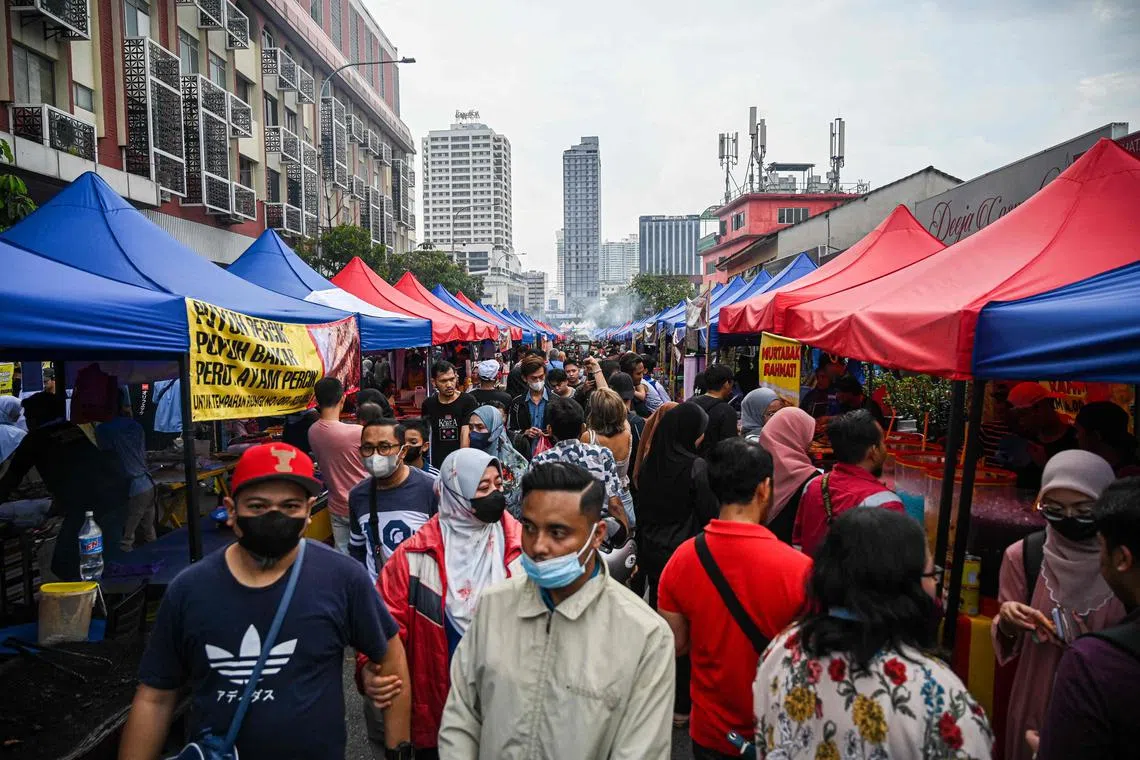Amid rising Covid-19 cases, health experts urge Malaysians to mask up
Sign up now: Get insights on the biggest stories in Malaysia

People who have not completed their Covid-19 vaccination regimen should be masked when in public, said a health expert.
PHOTO: AFP
Follow topic:
PETALING JAYA – With a rise in Covid-19 cases in Malaysia of late
Individuals at high risk of developing severe Covid-19 include the elderly, obese people, those with high comorbidities and those who are immunocompromised, such as people with diabetes and cancer.
“They are highly encouraged to wear masks,” said public health expert Sharifa Ezat Wan Puteh of Universiti Kebangsaan Malaysia.
She said people who have not completed their vaccination regimen, either with primary vaccination or a booster, should be masked when in public.
“It is better to be safe than sorry. Get yourself vaccinated, including the boosters. If you’re at high risk, wear a mask in public areas where there are many people who may be transmitting or carrying the virus,” she said.
Professor Sharifa also spoke about an upsurge in cases at certain schools, adding that students who are at risk should wear masks.
“The increase in Covid-19 cases is expected due to a few highly transmissible Omicron strains, unmasking and many of us moving freely across states and in our workplaces,” she noted.
“However, the main issue is whether the rise in cases will lead to hospitalisation or even deaths.”
A statement from Malaysia’s Health Ministry last Thursday said hospital admissions of people with Covid-19 had increased by 17.6 per cent at the beginning of April, compared with the previous month.
Health Minister Zaliha Mustafa said that among those hospitalised, 63.8 per cent were aged 60 and above, and 90.7 per cent had comorbidities.
Most patients had mild symptoms. The number of deaths among patients who were not vaccinated was six times that among those who had received a single vaccine dose, Dr Zaliha added.
Professor Moy Foong Ming of Universiti Malaya’s Department of Social and Preventive Medicine suggested that the Health Ministry should intensify its public messages on the importance of wearing masks and encourage people to do so during a surge in cases.
As for infections in schools, she said parents should not send children with symptoms to school.
“The school management should be alert to the health status of their staff and students. Take appropriate action when any of the staff or students are unwell,” Prof Moy said.
However, the experts are of the view that it is not necessary to make it mandatory for people to wear face masks.
Prof Moy said making the wearing of face masks mandatory is no longer feasible as Malaysia is transitioning to the phase of living with Covid-19 as an endemic disease.
“We are to coexist with the virus. The public should have internalised the preventive measures and should carry them out voluntarily when there is a surge in cases,” she said.
“If masking is made compulsory, then there should be punitive measures on those who don’t comply.
“This will not educate the public; rather, they will mask up because of fear of possible punitive action taken against them.”
Malaysian Public Health Physicians’ Association president Zainal Ariffin Omar also believes masking should not be made mandatory but strongly encouraged instead.
“I think the public will not be too receptive if mandatory masking and added regulations are imposed,” Dr Zainal said, adding that people should be encouraged to self-test and self-quarantine should they show symptoms.
Universiti Putra Malaysia medical epidemiologist Malina Osman said current measures can be maintained, but those who test positive must wear a mask to protect others.
“Those who are sick should stay at home and be quarantined. If they need to be in public, wearing a mask is a must,” she said.
Associate Professor Malina added that the decision to make masking compulsory should be taken only if the increase in Covid-19 cases poses a threat to the country’s healthcare system.
“Currently, there is no such indication, so there is no urgent need to make it compulsory,” she said.
However, there is a need to enhance public awareness so that people can take responsible steps, she added.
Prof Malina said the rise in cases is most likely due to the current strain being highly infectious.
“In general, we have to be more cautious. People are encouraged to mask up in public, be mindful of hand hygiene and cough etiquette,” she said. THE STAR/ASIA NEWS NETWORK

